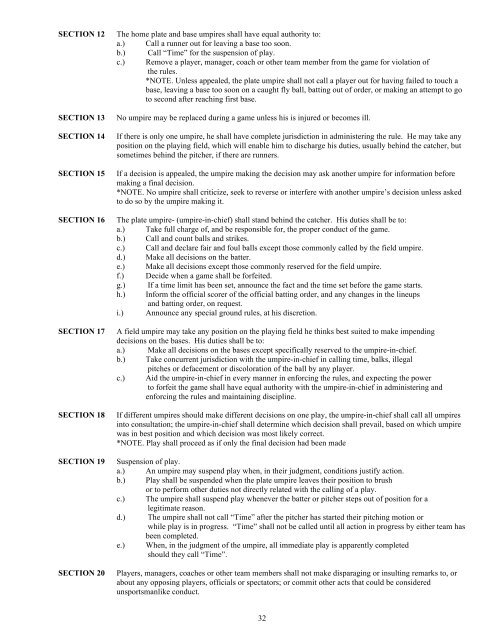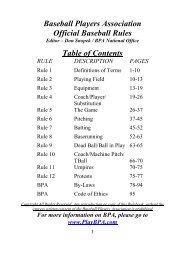baseball players association rule 1 definitions of terms
baseball players association rule 1 definitions of terms
baseball players association rule 1 definitions of terms
Create successful ePaper yourself
Turn your PDF publications into a flip-book with our unique Google optimized e-Paper software.
SECTION 12<br />
SECTION 13<br />
SECTION 14<br />
SECTION 15<br />
SECTION 16<br />
SECTION 17<br />
SECTION 18<br />
SECTION 19<br />
SECTION 20<br />
The home plate and base umpires shall have equal authority to:<br />
a.) Call a runner out for leaving a base too soon.<br />
b.) Call “Time” for the suspension <strong>of</strong> play.<br />
c.) Remove a player, manager, coach or other team member from the game for violation <strong>of</strong><br />
the <strong>rule</strong>s.<br />
*NOTE. Unless appealed, the plate umpire shall not call a player out for having failed to touch a<br />
base, leaving a base too soon on a caught fly ball, batting out <strong>of</strong> order, or making an attempt to go<br />
to second after reaching first base.<br />
No umpire may be replaced during a game unless his is injured or becomes ill.<br />
If there is only one umpire, he shall have complete jurisdiction in administering the <strong>rule</strong>. He may take any<br />
position on the playing field, which will enable him to discharge his duties, usually behind the catcher, but<br />
sometimes behind the pitcher, if there are runners.<br />
If a decision is appealed, the umpire making the decision may ask another umpire for information before<br />
making a final decision.<br />
*NOTE. No umpire shall criticize, seek to reverse or interfere with another umpire’s decision unless asked<br />
to do so by the umpire making it.<br />
The plate umpire- (umpire-in-chief) shall stand behind the catcher. His duties shall be to:<br />
a.) Take full charge <strong>of</strong>, and be responsible for, the proper conduct <strong>of</strong> the game.<br />
b.) Call and count balls and strikes.<br />
c.) Call and declare fair and foul balls except those commonly called by the field umpire.<br />
d.) Make all decisions on the batter.<br />
e.) Make all decisions except those commonly reserved for the field umpire.<br />
f.) Decide when a game shall be forfeited.<br />
g.) If a time limit has been set, announce the fact and the time set before the game starts.<br />
h.) Inform the <strong>of</strong>ficial scorer <strong>of</strong> the <strong>of</strong>ficial batting order, and any changes in the lineups<br />
and batting order, on request.<br />
i.) Announce any special ground <strong>rule</strong>s, at his discretion.<br />
A field umpire may take any position on the playing field he thinks best suited to make impending<br />
decisions on the bases. His duties shall be to:<br />
a.) Make all decisions on the bases except specifically reserved to the umpire-in-chief.<br />
b.) Take concurrent jurisdiction with the umpire-in-chief in calling time, balks, illegal<br />
pitches or defacement or discoloration <strong>of</strong> the ball by any player.<br />
c.) Aid the umpire-in-chief in every manner in enforcing the <strong>rule</strong>s, and expecting the power<br />
to forfeit the game shall have equal authority with the umpire-in-chief in administering and<br />
enforcing the <strong>rule</strong>s and maintaining discipline.<br />
If different umpires should make different decisions on one play, the umpire-in-chief shall call all umpires<br />
into consultation; the umpire-in-chief shall determine which decision shall prevail, based on which umpire<br />
was in best position and which decision was most likely correct.<br />
*NOTE. Play shall proceed as if only the final decision had been made<br />
Suspension <strong>of</strong> play.<br />
a.) An umpire may suspend play when, in their judgment, conditions justify action.<br />
b.) Play shall be suspended when the plate umpire leaves their position to brush<br />
or to perform other duties not directly related with the calling <strong>of</strong> a play.<br />
c.) The umpire shall suspend play whenever the batter or pitcher steps out <strong>of</strong> position for a<br />
legitimate reason.<br />
d.) The umpire shall not call “Time” after the pitcher has started their pitching motion or<br />
while play is in progress. “Time” shall not be called until all action in progress by either team has<br />
been completed.<br />
e.) When, in the judgment <strong>of</strong> the umpire, all immediate play is apparently completed<br />
should they call “Time”.<br />
Players, managers, coaches or other team members shall not make disparaging or insulting remarks to, or<br />
about any opposing <strong>players</strong>, <strong>of</strong>ficials or spectators; or commit other acts that could be considered<br />
unsportsmanlike conduct.<br />
32



